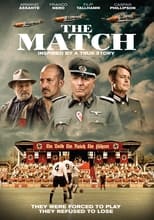This World War 2 drama sat in my Amazon watchlist for a very long time, as I am reluctant to watch dramas that I know can only have a sad ending. It is after all, based on a true story that was borrowed for the derivative but famous 1981 film Victory. But The Match is worth watching just for the performances. Andrej Dojkic makes a heroic if somewhat crazed Hungarian footballer and Caspar Phillipson is his tightlipped tormentor.
The Story
Franco Nero plays an elderly man who explains this concentration camp story to his grandson. It begins with a fanciful scene at a night club where Laszlo Horvath’s fellow footballers defeat Nazis in a contest of keepy uppy. Laszlo (Andrej Dojkic) is hauled off to a concentration work camp, and some time later during a beating, a new commander (Caspar Phillipson) recognizes him and challenges him to a game in honor of Hitler’s birthday, which is in 30 days.
For his team, Laszlo negotiates for better food, less work, more mail deliveries, allocated time for letter writing, and the authority to recruit more players from other work camps. From these camps, he recruits a violinist and a young boy (Franco Nero’s character). Later, Laszlo says his intent is for this boy to survive and grow up.
Laszlo focuses his team on winning the game, while the Colonel undermines their development and yet strives to put on an event to impress his superior. There are bits of soccer strategy in the film, as Laszlo figures out how to beat the Nazis when his unfit players can barely defend, much less score.
At halftime, Laszlo negotiates for his players’ freedom if they lose the game, and then he leaves the outcome up to individual choice. He tells the young boy to hide in the stadium before the game ends. It is the last time the boy will see the players.
The Real Story
The real story of the Death Match is in some controversy, as some stories have become legend and evidence is scant. Russia released a 2012 version of the story (Матч) which was considered to be nationalist propaganda. Perhaps in response, the BBC published an 8 minute video of the known facts.
In 1942, FC Start, a wartime bakery football team, formed mainly of Dynamo Kiev players, took on and beat their Nazi Occupiers. It was said in the Soviet Union, that these players were all shot as a result of their victory – and the game became known as The Death Match.
Four players were executed or tortured to death, and they are memorialized in a statue outside the Dynamo Kiev stadium (which I do not know if it still exists under Putin’s war).
Why was this film made?
I always wonder why films are made, and in this case, I wondered why anyone would remake a blockbuster film on such a small scale. E.g., the prison camp has just 1 barrack and maybe 15 prisoners. In fact, I was initially confused because the work detail looked like they were doing someone’s landscaping.
It turns out that New Jersey philanthropist Stephen Ollendorff lost the entire paternal side of his family in the Holocaust. In his 2014 commencement address at Ohio Wesleyan University, he explained why he supports the increase of cross-cultural and religious understanding and tolerance, as well as the remembrance of the Holocaust so that it is not repeated.
But strangely enough, the directors of this film are a father-son Croatian team: Jakov Sedlar (father) and Dominik Sedlar (Croatian-American son). Jakov Sedlar was a propagandist filmmaker for the fascist Franjo Tudman Croatian government. Jakov’s 2016 film about Croatian concentration camps, Jasenovac – the Truth, has been accused of being a Holocaust denial documentary. It makes me wonder if philanthropist Ollendorff was too naive or too trusting to be aware of this fact, or if he was a very forgiving philanthropist.
The Match actually makes very few references to Jewish prisoners. Almost all the prisoners wear red armbands, and one wears a beige one, which I think is for gypsies (Roma). Perhaps in homage to the real Death Match, the prisoner co-captain is a baker.
Another reality check… Having toured concentration camps in Germany, Cambodia, Vietnam, and California, I feel that a sports film like this wrongly humanizes a horrible situation that embodies man’s inhumanity to man. In reality, no one would line up a bunch of starving prisoners against soldiers. Maybe we can laugh at Mean Machine and cons against the guards. I remember when Hogan’s Heroes first showed up on TV, and many were horrified at its inappropriateness 20 years after World War 2. But it became a very popular, long-running show. Shows and films like this make us think it is easy to overcome oppressors, and maybe that is a mindset we need to avoid, especially today.
The Soccer
The soccer is not bad. The juggling scene in the beginning is dumb but sort of cute. The film credits special appearances by Croatian footballers Dejan Lovren, Mateo Kovačić, and Croatian-Australian Mark Viduka, with football coaching by Croatian Marko Marić, and with thanks to the Croatian Football Federation.
In Conclusion
The Match is a very low-budget Victory (1981) where no one tries to escape and every player dies. I ended up having to unlearn more stuff than I learned, which is disconcerting. But the performances are excellent. If you just want to fill your soccer movie bucket list, you could do worse.
Another thing I found interesting is that Croatian actor Andrej Dojkic as Laszlo is not pictured on the movie poster, instead they include Swede Filip Tallhamn, who plays the baker.
7 Soccer Movie Mom Rating = 7
Resources:
- Released: 2020-09-01 (internet)
- I watched this on Amazon Prime
- 1 hr 59 mins
- IMDB
- WIKI
- Director: Dominik Sedlar , Jakov Sedlar
- Stars: Andrej Dojkic (Laszlo Horvath) , Caspar Phillipson (Colonel Franz)
- Watch the Trailer

